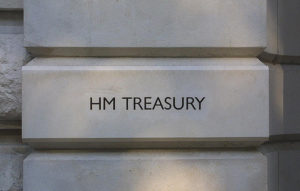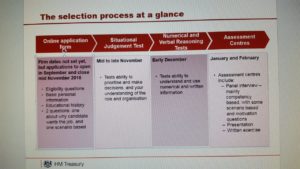This graduate scheme closes on 11 November 2016 http://www.hmtreasurycareers.co.uk/.
Careers Adviser Sue Briault visited HM Treasury on a very stormy wet day in July 2016. This is what she learnt about HM Treasury's Graduate Scheme.
Alumni Contacts
In 2016 there were two successful candidates from Bath but not many from Bath applied so conversion from application to job was good. There are three alumni on Bath Connection working in the Treasury who you can talk to http://www.bath.ac.uk/alumni/help/engage/bath-connection.
About HM Treasury
HM Treasury is the government’s economic and finance ministry, maintaining control over public spending, setting the direction of the UK’s economic policy and working to achieve strong and sustainable economic growth. It’s responsibilities include deciding how tax is collected, deciding how public spending is operated across the whole UK public sector and working to influence the financial sector by working with stakeholders like the Bank of England and the FSA. HM Treasury is not only concerned with domestic issues. They work to stimulate international initiatives that will enhance the UK’s prospects on the global stage so there are EU and International opportunities. For this reason it is described as being at the heart of government for, without it, other government departments would be unable to work. The Treasury is structured in groups, each specialising in a different field or activity. The website is pretty good as explaining this and includes a range of case studies http://www.hmtreasurycareers.com/inside-hmt/.
The team is small, totalling 1300 at present, and will be reduced down to 1100 within 4 years however the turnover, mainly to other parts of the Civil Service, is quite high and so they will continue to take in around 80 new people a year. The team is also young; 40% of staff are under 30 and 71% are under 40, and the gender balance is good: 43% of top management are women.
HM Treasury Graduate Scheme
The recruitment is usually for 80 people and there are two intakes a year: September and April.
Unlike the Civil Service Fast Stream this graduate scheme is totally policy focused so the attraction of the Scheme is that it is very intellectual. Although they do make candidates take a numeracy test the level of this is the same as most ordinary graduate schemes and not at the level of those run by Investment Banks. The level is GSCE and the need to test is that policy work does involve looking at numbers and drawing conclusions but is not number crunching. It was emphasised that most candidates should, with practice, be able to pass the numerical test.
Policy Advisers work on a specific area of economic or financial policy and projects. The roles are varied and graduates specialise in a policy area ranging from banking regulation to health spending, to how individuals are taxed.
Typically they could be involved in:
* researching and gathering information from a variety of sources;
* analysing and evaluating complex data and evidence to develop or enhance policy ideas;
* writing submissions and briefings for Ministers, senior managers or officials;
* responding to written questions from MPs, individuals from organisations and members of the public;
* working collaboratively with other teams across the Treasury, Government departments and external organisations (The Bank of England, regulatory bodies, private sector companies etc.) to debate and shape policy;
* leading projects in high profile policy areas which may include line managing a member of staff;
* working flexibly to meet deadlines and priorities (e.g. before the Budget or Autumn Statement or to respond to urgent pieces of work).
Register your interest to keep up to date with events at the Treasury http://www.hmtreasurycareers.co.uk/register-interest/.
Structure of the programme:
There are two 18 month placements and candidates can indicate their preference although we were told that most who express a preference will select EU and International areas so applicants should think more widely. The second placement is a mix of what the graduate wants combined with business need and it is common to change to a totally different area as HMT see this as an advantage.
Required qualifications and experience:
* good educational background including a 2.1 degree (in any discipline) (successful candidates do come from a broad range of subjects so don’t be put off applying)
* research skills
* experience of analysing complex quantitative and qualitative information;
* experience of summarising and integrating key information in succinct written reports
* evidence of a quality focus and attention to detail
* ability to work independently and balance long-term and short-term priorities
* ability to build rapport and work collaboratively with internal and external stakeholders
* evidence of an interest in political and economic affairs (at a national and/or international level)
*motivation to work in policy and understanding of the role of the Civil Service and Treasury
* strong stakeholder management and influencing skills
* flexible approach
* IT skills including Word, PowerPoint and Excel
* candidates must also meet Nationality requirements of Civil Service. You can apply for as long as you are a UK national and need to have lived in the UK for three years. In addition these posts are open to Commonwealth citizens and currently still to nationals of any of the member states of the European Economic Area (EEA) provided they meet requirements. At some point this latter group will have their status changed once the UK's exit from the EU is settled Civil Service are never in a position to apply for a work visa.
Meet the Graduates
Mark - Policy Adviser, Inheritance Tax and Trusts, Personal Tax, Welfare and Pensions
Mark studied History and he loves the work because he says it is intellectually challenging. There are many puzzles and problems to look at. He also enjoys the ministerial engagement. He said he found his degree was useful because he was used to using sources to identify relevant material and scrutinising opinions. He said there is variety in the placements you do. Previously he was in Building Societies but now he is in Inheritance Tax. This latter role requires him to be more cautious when dealing with stakeholders as Inheritance Tax is a much more emotional issue. His advice for applicants is to engage with the Civil Service Competency Framework https://www.gov.uk/government/publications/civil-service-competency-framework as this is key to getting through selection but also in framing your future career. The other advice was to be broadly read. He said reading a broadsheet newspaper and thinking about the implications of what you read on government policy and learning about government policy and relating that to the work of the Treasury.
Akash - Policy Adviser, Sanctions and Counter Illicit Finance, International and EU Group
Akash studied Global Politics and he was attracted to the role because it was wholly policy work unlike the Fast Stream. He also applied to Strategic Consultants including PWC and Deloitte and was successful at getting through the Fast Stream as well. This is his first posting joining in 2015 and he is working on the Financial Sanctions Regulation regarding Iran. This has involved travel to Iran, USA and OECD. He feels his degree has helped him in understanding the viewpoints of different countries. He talked about a very flat hierarchy so he says you have a lot of early responsibility and find yourself reporting to quite senior people from the outset. He said challenging a point of view is an essential part of the work and you need to stay true to that even in the recruitment process. He was asked if he found it frustrating being the adviser rather than the decider but he said that most of the time advice is taken and if the Minister doesn’t there is usually good reason so you just have to move on. It wasn’t a problem for him.
He said he found the work unexpectedly fast-paced. He responded to a question about work-life balance. He described his work as not being 9 to 5 as such but he knew he had a better work life balance than his City peers. He described there being a positive attitude to flexible working, an encouragement to take time back when you have worked long hours, and a possibility that you can prioritise your personal life over work from time to time. He also emphasised for candidates to get to grips with the Competency Framework.
The downside to working in Government is that there are no perks in terms of bonuses, travelling first class, eating out and secretarial support but he didn’t regret the trade off with the intellectual content of the job.
Akash is being supported to a Graduate Diploma in Economics.
Kathleen - Policy Adviser, Energy and Carbon Taxes, Business and International Tax
Kathleen studied Geography and came out with a BA however she did study some Physical Geography in her first year which she found useful for her current role in Energy and Carbon Taxes. Previously she worked in the Central Budget Office. She felt her degree was useful as you need to be able to look at the bigger picture, condense a point of view, meet deadlines; it was normal for there to be very short deadlines, and she found the writing style very different to what she was used to. She had done two years on a graduate scheme in business before joining the Treasury. She was surprised by the young dynamic environment. She recommended getting some work experience in the Civil Service if you can although HR said that all kinds of work experience was useful. Her proud moment was going to the OECD as the UK Energy Delegate.
Application Process
We were told of the main pitfalls of the application process and areas for improvement for candidates.
Situational Judgement Test: Don’t be intimidated by this. It is selecting candidates out rather than in so there is a bar to pass rather than the top scorers being selected. It’s testing judgement, prioritising and decision-making skills. Make sure you are familiar with the Treasury values and understand impartiality as this will help with context. This test requires high level reading skills.
Interviews: You need to be able to explain what you personally did in the example you are using and be able to identify strategies for addressing challenges you faced. In particular you will be asked what you will find challenging in the role and how you will address this. Most people tend to just answer first part of the question. The Civil Service still interviews using competency questions with some scenario questions to draw out required competencies. The Civil Service Competency Framework runs through the heart of the Civil Service recruitment and its development of staff so get to know it.
Presentation: Stick to the brief, cover everything requested, manage the time given, avoid jargon and consider the audience. Economists often resort to jargon when their audience is clearly indicated as a non-economist. Watch effective presentations – e.g. TED talks
Written exercise: Manage the time so you do everything required. Make sure you connect your analysis to your recommendations. Anticipate and deal with objections. Make sure you present a balanced argument with pros and cons. This task was seen as a common failing in candidates who otherwise excel. The skill is very different to writing essays and candidates with work experience are often better at the type of writing required. Much of the writing is for non-experts.
PhD candidates are very welcome to apply but they should be mindful not to come across as too academic. You do not need to know everything before writing something. The work is fast paced so you need to be able to write confidently without deep dive research.
Respond


